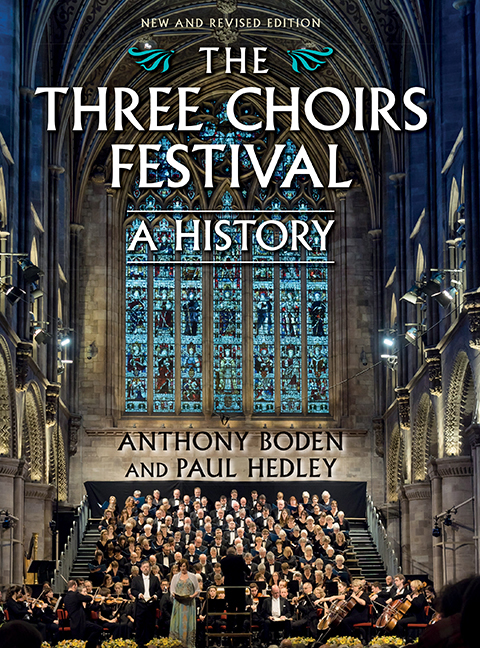Book contents
- Frontmatter
- Contents
- List of Illustrations
- Preface
- Acknowledgements
- List of Abbreviations
- List of Cathedral Organists
- 1 Origins
- 2 A Fortuitous and Friendly Proposal
- 3 A Numerous Appearance of Gentry
- 4 ‘The Musick of my Admiration Handel’
- 5 The Gentlemen and the Players
- 6 Avoiding Shipwreck
- 7 Prima voce
- 8 Favourites and Flops
- 9 Sacred and Profane
- 10 Froissart
- 11 The Unreasonable Man
- 12 The Dream
- 13 Beyond these Voices
- 14 An Essentially English Institution
- 15 The Elgar Festivals
- 16 Dona nobis pacem
- 17 Recovery
- 18 Association
- 19 A New Epoch
- 20 Jubilee
- 21 Theme with Variations
- 22 Houses of the Mind
- 23 ‘A Gold-Plated Orchestra’
- 24 A New Millennium
- 25 Reorganisation
- 26 An Invitation to the Palace
- Appendix Three Choirs Festival Timeline
- Select Bibliography
- Index
- Plate section
2 - A Fortuitous and Friendly Proposal
Published online by Cambridge University Press: 11 August 2017
- Frontmatter
- Contents
- List of Illustrations
- Preface
- Acknowledgements
- List of Abbreviations
- List of Cathedral Organists
- 1 Origins
- 2 A Fortuitous and Friendly Proposal
- 3 A Numerous Appearance of Gentry
- 4 ‘The Musick of my Admiration Handel’
- 5 The Gentlemen and the Players
- 6 Avoiding Shipwreck
- 7 Prima voce
- 8 Favourites and Flops
- 9 Sacred and Profane
- 10 Froissart
- 11 The Unreasonable Man
- 12 The Dream
- 13 Beyond these Voices
- 14 An Essentially English Institution
- 15 The Elgar Festivals
- 16 Dona nobis pacem
- 17 Recovery
- 18 Association
- 19 A New Epoch
- 20 Jubilee
- 21 Theme with Variations
- 22 Houses of the Mind
- 23 ‘A Gold-Plated Orchestra’
- 24 A New Millennium
- 25 Reorganisation
- 26 An Invitation to the Palace
- Appendix Three Choirs Festival Timeline
- Select Bibliography
- Index
- Plate section
Summary
THE musical club which met in the hall belonging to the vicars choral at Hereford was, as Lysons pointed out, ‘an establishment of little expense: the performances were all gratis, except that of Mr Woodcock, their leader, whose nightly pay was five shillings. The members were regaled with ale, cyder and tobacco. ’
The Woodcocks were a musical family. Hawkins, speaking of Robert Woodcock, famous as a flute-player and composer for that instrument, adds:
He had a brother named Thomas, who kept a coffee-house at Hereford, an excellent performer on the violin, and played the solos of Corelli with exquisite neatness and elegance. In that country his merits were not known, for his employment was playing country-dances, and his recreation angling. He died about the year 1750.
At some time before mid-century, the Hereford musical club meetings had fallen into abeyance. They were revived in 1749 by William Felton, a vicar choral from 1741 to 1769, who transferred the concerts from the College Hall to the coffee house in St John Street, then owned by Frank Woodcock, which possessed the only room in the city large enough for the purpose. This new arrangement seems to have been quite profitable to Woodcock. The articles of the society, drawn up by Felton, show that Woodcock was to be paid 7s. for his performance (presumably on the violin) and 15s.: ‘for the use of his Room, Fires, Forms & Candles for the two Sconces & Desks and Harpsichord’. In addition, Frank Woodcock's son, Francisco, was also to receive 2s. 6d. as a performer, and the Treasurer of the society was one John Woodcock. In the face of a potential monopoly it was perhaps prudent of Felton to ensure that the articles allowed that: ‘It shall be in the power of the Performers (who are not paid) to remove this meeting to any other place they shall think proper.’ Among the performers who were paid, apart from Woodcock and son, appear the Hereford Cathedral Organist, Henry Swarbrick, who played the harpsichord and was also responsible for ensuring that it was tuned, and a Mr Dyer, both of whom received 7s. 6d., and one Jemmy George, who was paid 10s. 6d.
- Type
- Chapter
- Information
- The Three Choirs Festival: A HistoryNew and Revised Edition, pp. 15 - 27Publisher: Boydell & BrewerPrint publication year: 2017

